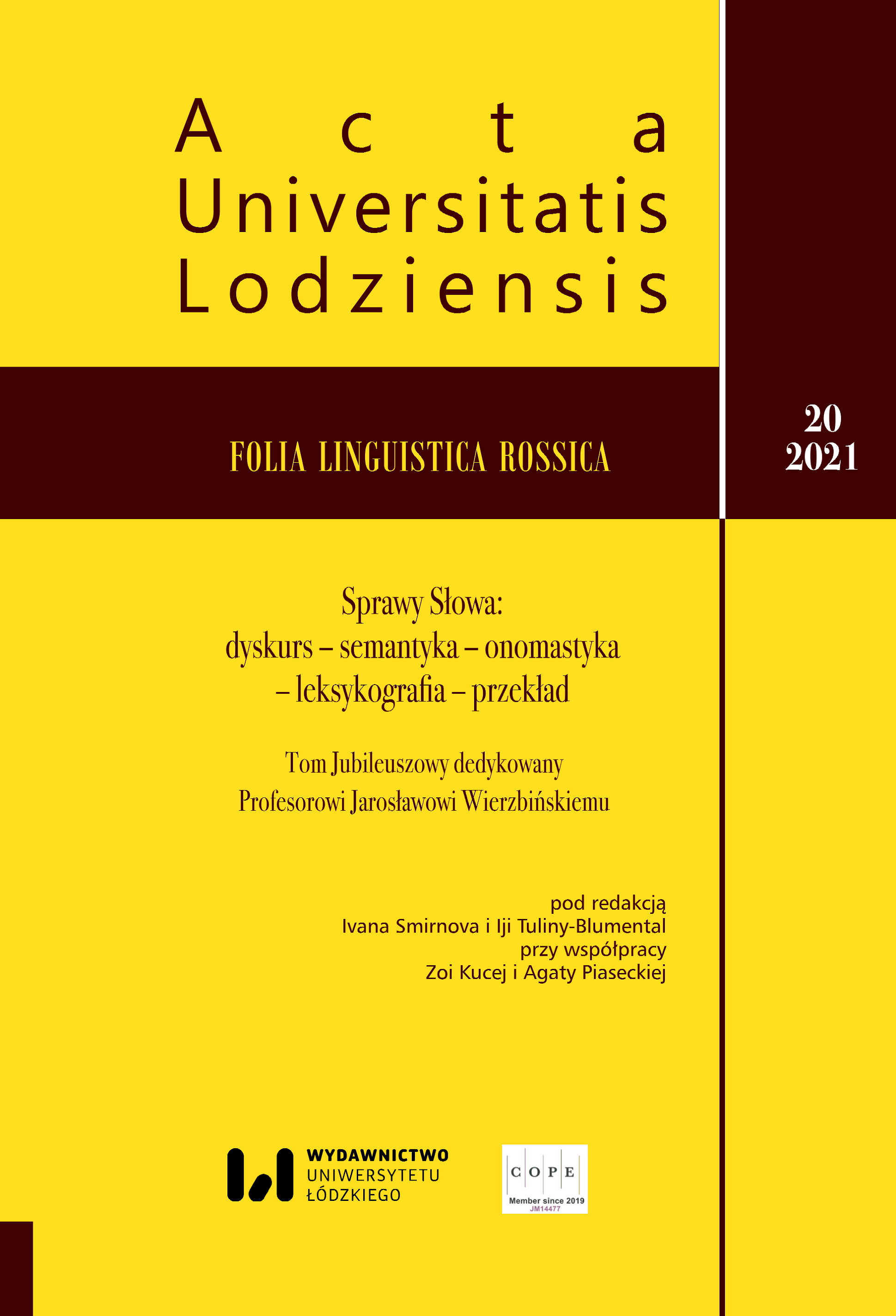Functional and Pragmatic Features of Slogans and Appeals of the Soviet Era: Semantic, Semiotic and Psycholinguistic Aspects
DOI:
https://doi.org/10.18778/1731-8025.20.06Keywords:
semantics, structure, typology, communication, appealAbstract
The article is devoted to the problems of organizing the information space using propaganda slogans and appeals that were typical of the Soviet era between the 1970s and 1990s. All totalitarian systems exploit ideologemes in an exaggerated version, as well as various types of appeals. These information messages are one of the key tools of totalitarian myth-making. And, as historical experience has shown, their operation is very effective. Since the twenty-first century is not free from totalitarian regimes, as well as trends, in those countries that have discarded old regimes and have embarked on the path of democratic development, totalitarian propaganda methods are seen as a ballast, yet they are present and affect the information landscape. They also promote destructive tendencies in the humanitarian sphere in general and interfere with the process of objective coverage of the past and present. This area requires in-depth and systematic research, which is currently in infancy.The article explores one of the facets of the problem.In the process of describing the complex of propaganda appeals, the author relies on the methods of analysis, synthesis, end-to-end sampling, and differentiation based on pragmatic features. As a result, more than 150 slogans and appeals of the communist era were selected, which are among the universal and most used and distributed in terms of the headings, and their main suggestive functions were analysed. At this stage of the study, key theses were formulated that highlight the artificiality and inconsistency of the programme statements of the era of stagnation, as well as their destructive function in relation to the socio-mental and communicative axiological picture of the world.
References
Аджемоглу, Д., Робінсон, Д. (2018). Чому нації занепадають. Походження влади, багатства та бідності. Київ: Наш формат.
Google Scholar
Вежбиньски, Я. (2014). Семантика и стилистика политических лозунгов, воззваний и цитат советского периода. В: A. Piasecka i I. Blumental (red.), W kręgu zagadnień semantyki i stylistyki tekstu (169–177). Łódź: Wydawnictwo Uniwersytetu Łódzkiego, https://doi.org/10.18778/7969-416-7.18
Google Scholar
Вежбицкая, А. (1999). Семантические универсалии и описание языков. Москва: Языки.
Google Scholar
Воробьев, В.В. (2008). Лингвокультурология. Москва: Российский университет дружбы народов.
Google Scholar
Мельник, Я.Г. (2012). Пролегомени до українського дискурсу. Івано-Франківськ: Вид-во Прикарпатського університету.
Google Scholar
Мельник, Я.Г. (2021). Риторика молчания, Лингвориторическая парадигма: теоретические и прикладные аспекты, 26 (1). Сочи: Сочинский государственный університет.
Google Scholar
Москалець, В.П. (2020). Психологія особистості. Київ: Ліра-К.
Google Scholar
Почепцов, Т.Г. (2001). Теория коммуникации. Киев: Рефл-бук Ваклер.
Google Scholar
Серебренников, Б.А. (ред.). (1988). Роль человеческого фактора в языке. Язык и картина мира. Москва: Наука.
Google Scholar
Слухай, Н.В. (2019). Сугестивна лінгвістика: лінгвістичне програмування поведінки людини. Київ: Видавничий дім Дмитра Бураго.
Google Scholar
Степанов, Ю.С. (1995). Изменчивый «образ языка» в науке ХХ века. В: Язык и наука конца 20 века. Москва: Российский государственный гуманитарный университет.
Google Scholar
Adzhemoglu, D., Robіnson D. (2018). Chomu natsії zanepadayut’. Pokhodzhennya vladi, bagatstva ta bіdnostі. Kiїv: Nash format.
Google Scholar
Mel’nik, Ya.G. (2012). Prolegomeni do ukraїns’kogo diskursu. Іvano-Frankіvs’k: Vid-vo Prikarpats’kogo unіversitetu.
Google Scholar
Mel’nik, Ya.G. (2021). Ritorika molchaniya, Lingvoritoricheskaya paradigma: teoreticheskie i prikladnye aspekty, 26 (1). Sochi: Sochinskii gosudarstvennyi unіversitet.
Google Scholar
Moskalets’, V.P. (2020). Psikhologіya osobistostі. Kiїv: Lіra-K.
Google Scholar
Pocheptsov, T.G. (2001). Teoriya kommunikatsii. Kiev: Refl-buk Vakler.
Google Scholar
Serebrennikov, B.A. (red.). (1988). Rol’ chelovecheskogo faktora v yazyke. Yazyk i kartina mira. Moscow: Nauka.
Google Scholar
Slukhai, N.V. (2019). Sugestivna lіngvіstika: lіngvіstichne programuvannya povedіnki lyudini. Kiїv: Vidavnichii dіm Dmitra Burago.
Google Scholar
Stepanov, Yu.S. (1995). Izmenchivyi «obraz yazyka» v nauke KhKh veka. V: Yazyk i nauka kontsa 20 veka. Moscow: Rossiiskii gosudarstvennyi gumanitarnyi universitet.
Google Scholar
Vezhbin’ski, Ya. (2014). Semantika i stilistika politicheskikh lozungov, vozzvanii i tsitat sovetskogo perioda. W: A. Piasecka i I. Blumental (red.), W kręgu zagadnień semantyki i stylistyki tekstu (169–177). Łódź: Wydawnictwo Uniwersytetu Łódzkiego, https://doi.org/10.18778/7969-416-7.18
Google Scholar
DOI: https://doi.org/10.18778/7969-416-7.18
Vezhbitskaya, A. (1999). Semanticheskie universalii i opisanie yazykov. Moscow: Yazyki.
Google Scholar
Vorob’ev, V.V. (2008). Lingvokul’turologiya. Moscow: Rossiiskii universitet druzhby narodov.
Google Scholar
Downloads
Published
How to Cite
Issue
Section
License

This work is licensed under a Creative Commons Attribution-NonCommercial-NoDerivatives 4.0 International License.









